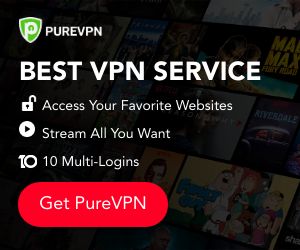This is part of our What You Can Do series which discusses things that you can do to get involved in the effort to defend the Constitution and protect individual liberties.
Your Online Privacy
This is an area we take seriously, especially in a climate where Mumbles Pelosi and her pack of goons is hunting their political opponents with the willing assistance of big tech. We are going to be picking plenty of (always non-violent) ideological fights and with the cancel culture running amok it’s good to know how to ensure that you stay off of the radar if you want to.
Continue reading or click a link to go directly to a section:
Get a VPN
“Ok nerd, what’s a VPN?” VPN stands for Virtual Private network and it is basically this: In simple terms, a VPN allows you to make an encrypted connection to a remote server directly from your computer, tablet, or smartphone. When you access the internet, your activity will appear to come from the remote server and not your own IP address (a unique number assigned to you by your ISP for a period of time). Your ISP will see that there is traffic on your connection but because the connection to the VPN server is encrypted, they cannot see what it is.
Why do I need a VPN?
When you use the internet at home or on your phone, the service provider (Xfinity, AT&T, Time Warner, FiOS, T-Mobile etc.) sees and tracks everything that you do. Your device is assigned an IP address by your ISP. All of your activity that runs through their servers is logged and associated with the IP address. On the other end, any web site that you visit is also able to see your assigned IP address and can track your activities on their site (and others through the use of browser cookies). Every web page visit can be logged and associated to you, with the date and time included. With a VPN you make a secure connection to a remote server and all data passing from you to the internet and back is fully encrypted and invisible to your ISP. Your ISP only sees that there is data moving, but they can’t see what it is or where it is from. On the other end, the web sites you visit will see the IP address of the remote server and not the one assigned to you by your ISP. A VPN will also protect you against prying eyes and hackers on public Wi-Fi connections.
This extra layer of security allows us to communicate with one another and share information without risks to our privacy. It also provides a mechanism where whistleblowers can safely share information with this site and others undetected. If you’d like a deeper discussion on any of the information in this article, post a question in the Community Forums.
Which VPN should I use?
There are a lot of VPN options out there and they vary widely in speed, quality, and privacy. I recommend staying away from Free VPN services as they tend to be overloaded and slow and in some cases, can be used as honeypots by hackers. The paid ones are relatively cheap and get even cheaper with longer term plans. Make sure you are using a reputable VPN service, even if you go the free route.
Things to look for: No Logging (Important!), 256-bit AES encryption (Important!), number and location of servers, device and operating system support, no bandwidth limits, and available add-ons (depending on your needs).
A couple that I can recommend based on personal experience are:
- PureVPN – To use a car term, this is one of my daily drivers. They have tons of fast servers worldwide, 256-bit AES encryption, 10 active logins, unlimited bandwidth, apps for a huge number of devices and operating systems, and No Logging (meaning they don’t log your activity or keep a trail of which IP you are assigned). They recently passed a surprise audit by KPMG to validate their no log claims and they are relocating their primary operations to the British Virgin Islands where they are not required to obey information requests from foreign courts. They offer a 31-Day money-back guarantee. Read all about them here.
- ProtonVPN – If you’re looking for street cred, these guys have it. It was created by former scientists at CERN to better protect activists and journalists who use ProtonMail (more on that below). They have a free version but you’ll get the best speed, stability, and features through one of their paid plans. They include 256-bit AES encryption, multi-platform support, 10 active logins, tons of servers, and unlimited bandwidth. Learn more here.
- ExpressVPN – Because of their marketing efforts this might be the most well known of the services. They use 256-bit AES encryption, have multi-platform support, and they do not keep any activity or connection logs. They have fewer servers worldwide than the others but the speed is solid. They allow 5 active logins and offer a 30-day money back guarantee.
- NordVPN* – This one comes with a caveat. I’ve used it. It use to be my primary VPN. It has a comparable set of features to the others listed above. HOWEVER, when I attempted to join their affiliate program, this was their response: “Unfortunately, your website’s content is not acceptable for promotion due to our brand policy. Thus, we cannot proceed further.” It kind of hurt my feelings. We broke up.
Encrypted Mail
If you are using one of the “free” email services out there, you should know something (if you don’t already). Your payment for for that free email is that you are giving Google, Microsoft, Yahoo!, or whoever it is, permission to scan the contents of your emails so that they can build a profile on you to serve you ads (and who knows what else) in your email and elsewhere when you are on the internet. They have access to everything you have ever sent or received. They know what sports teams you like; who you likely voted for; what streaming services you have; your gas, electricity and cable providers; if you’ve been happy, sad, sick, or had a fight with your spouse. Every single detail. And you told them it was okay.
The solution? Encrypted email.
Things to look for: End-to-End encryption (encrypted storage AND in transit), zero access encryption (the provider can’t decrypt and read them), server locations (is access to your data restricted by local laws), storage, features, cost. This is not encryption of an individual email as offered by some email services but full end-to-end account encryption.
Keep in Mind… End-to-End Encryption is dependent on both the sender and receiver. If you and another person are both using a service such as ProtonMail then your messages are automatically end-to-end encrypted. If you send from ProtonMail to a Gmail (or other free) account, the message will not be encrypted at the receiving end and therefore could be exposed. ProtonMail and others have the option to send securely to an outside user. In this case, the recipient receives a message that you have sent them a secure email and will use a link to access the message in their web browser with a password you have shared with them.
With that…
ProtonMail – We use it. It’s really good. Again, it was created by former scientists at CERN to provide a secure communication platform for the general public. They provide a free version which you can upgrade when you’re ready for more features and storage. They provide all of the features mentioned above and have even added a calendar option which is currently in public beta. They also have an onion site if you’re into that sort of thing.
StartMail – This is another popular service that has all of the features you’d expect. They don’t have a free option but you can sign up for a 7-day trial and give it a test drive. As an added bonus, you can pay for your subscription with Bitcoin
There are others such as Tutanota and Hush Mail (and many others) though we haven’t tried them and can’t specifically recommend them. All are not equal so make sure you do your research and select a reputable provider.
Web Browser
In short, your browser is spying on you. Everything you do online can be tracked. from the sites you visit, to your passwords, to the videos you watch, to the things that you buy can be stored and shared by your browser without your knowledge or consent. Then, advertisers, corporations, and others use that data to make billions in annual profits.
What about Incognito/InPrivate mode? It’s a good start but these modes do not provide as much privacy as you might think. Each browser behaves slightly differently with these modes enabled but in general, using Incognito/InPrivate will help automatically clean up any cookies, advertiser info, form entries etc. stored in your browser when you are done. However, your Internet Service Provider (ISP), the websites you’ve visited, the government, and other third parties can still track you with your IP address. (Hence the need for a VPN)
One thing you can do is switch to (or at least in stall and have available) a browser like…
Brave – It is built on Chromium (as are most browsers these days) but has been modified to have the privacy settings cranked up by default. You can see a comparison of privacy features by clicking here. Using a browser like Brave with a quality VPN will go a long way to locking up your personal information when browsing the web.
Search Engine
The final piece to this puzzle is your search engine. Google keeps your search history forever by default. Their trackers have been found on 75% of the top million websites. That means they are tracking you almost everywhere you go on the Internet. If you use an Android based phone you are giving them even more as they can track your location, which apps you use, your photos, and on and on. It takes effort to limit your exposure and the last piece to this puzzle is your search history.
DuckDuckGo – It was started in 2008 but has gained a ton of traction in recent years as people become more and more aware of their privacy (or lack of) online. As they say, “Our privacy policy is simple: we don’t collect or share any of your personal information.” That’s it. Because they don’t track anything, your search results don’t get manipulated with targeted advertising and there are no funky results based on your past history or built-in agendas. Check out their FAQ for more information.
If you have experience with one of the services mentioned here or any others you would recommend, leave a comment below.
Disclosure: Clicking on links to VPN and Email services may result in us receiving a small referral fee which is used to help offset the costs associated with running this site. We only provide referrals to services that we use ourselves and recommend.


















You must be logged in to post a comment.